Ginger Rogers's Golden Role
When Ginger Rogers was named Best Actress at the 1941 Academy Awards, no one was more surprised than Ginger Rogers. For almost a decade, she had been the sassy chorus girl, the sharp-tongued comedienne, and the perfect match for Fred Astaire. But that wasn't enough for the actress, who longed to prove that she was more than the wisecracking blonde with magic in her feet. Despite illustrating that she was incredibly talented in this type of role, comedies and musicals, as we all know, don't garner the respect and honors that dramas do and Ginger was dying to show that she had what it took.
1940's Primrose Path was her chance. But the censorship of the film's subject matter -- an impoverished young woman struggling with her mother and grandmother's history of prostitution -- and modest box-office receipts hindered Ginger's dramatic breakthrough. Luckily 1940 brought about another opportunity: Kitty Foyle. Spanning 11 years in the life of a lower-class Philadelphia woman who faces the true highs and lows of romance, Kitty Foyle was the film that gave Ginger the gold statuette she yearned for.
The funny thing is she didn't even want to play Kitty -- at first. After being given the 1939 novel by RKO producer David Hempstead, she read it while on a drive with her then-fiancé Howard Hughes and was appalled that Hempstead would suggest such a "highly suggestive" and "lurid" property for her. "There were explicit love scenes in it that were quite disturbing to me," Ginger recalled in her autobiography. When she mentioned this to her mother Lela later that evening, Lela was quick to remind her daughter that such material would have to be rewritten because of the Production Code. Ginger realized she was right and waited until the completed script was ready over a month later. Thrilled with Dalton Trumbo and Donald Ogden Stewart's work, Ginger happily accepted the part and, along with The Major and the Minor (1942), it became her most cherished film experience. "In Kitty Foyle, I had an opportunity to create a three-dimensional portrait of a young American woman," she wrote, "and when the picture was finished, I felt I'd met the challenge."
She most definitely did, and Academy voters evidently agreed, but Ginger's win is still a fascinating one to consider. Kitty Foyle is very much the kind of role the Oscars love. The film begins with her getting engaged to Dr. Mark Eisen (James Craig) only to have the love of her life, Wyn Strafford (Dennis Morgan), reappear. Conflicted about which man is the right choice, the film becomes a series of flashbacks as Kitty reflects on her upbringing by her beloved father, her earth-shattering and tragic romance with Wyn, the enormous class divide that ultimately kept them apart, and her hesitant relationship with Mark that never fully clicked because of her lingering feelings for Wyn.
While all of this made Ginger's Oscar nomination a foregone conclusion, her fellow nominees made her victory much less of a sure thing. Not one, not two, but three instantly iconic performances were the majority of Ginger's competition: Bette Davis as a scheming murderess in The Letter, Katharine Hepburn's infamous comeback as Tracy Lord in The Philadelphia Story, and Joan Fontaine as the intensely vulnerable Mrs. de Winter in Rebecca.* So how in the world did Ginger win?
The simplest answer is "by being Ginger Rogers." Kitty Foyle was irrevocable proof that she could handle anything, that she could be more than one-half of Astaire & Rogers. That shift alone likely encouraged some voters to choose her, but it has to be pointed out that although it isn't as talked about as Davis, Hepburn, and Fontaine's work (just like Kitty Foyle itself isn't considered on the same level as The Letter, Philadelphia Story, and Rebecca), Ginger gives a gorgeous, nuanced performance that dominates and elevates every aspect of the film.
Her performance is also a lesson in restraint and naturalness. There are so many tender melodramatic moments and Ginger infuses them all with a reality and a quiet dignity that stops you from scoffing in disbelief. Spoilers in the rest of the post! When Kitty wakes up after giving birth to her and Wyn's son and she slowly realizes her baby -- the one piece of Wyn she thought she'd have forever -- didn't live, she doesn't cry herself into hysterics or wail uncontrollably. Instead, we see her face as she stares into the distance, her eyes getting misty as she mumbles about the future her son would never have.
Director Sam Wood gifts us with many such close-ups of Ginger, clearly aware that one of her greatest assets was her expressive face and her stunning blue eyes that penetrated the celluloid regardless of whether or not the film was in color. Everything you need to know about Kitty, you can read from Ginger's face: her pure adoration for Wyn, her reluctant love for Mark, her refusal to conform to the traditions of Wyn's family, her determination to survive on her own terms... Wood's close-ups leave the storytelling to Ginger and never for a second does she disappoint.
Just look at the scene where Kitty meets the son Wyn had after he was forced to marry a woman his family approved of. Kitty is all too aware that her own child would have been the same age and looked similar to the adorable little boy in front of her. You can practically see the lump in her throat as she begins to talk to him, the pain of her loss apparent even in the small smile that appears.
Ginger understood that Kitty is a fighter, a woman who carries her head high even when she is devastated. And trust me, there is a lot of devastation. But there is also a lot of joy and romance in Kitty Foyle. The moments between Kitty and Wyn are so swoon-worthy they make me melt into a puddle every time. (I can't even tell you how hard I fell for Dennis Morgan when I first saw him in this film. As if my screenshots aren't a dead giveaway...) The love that Wyn and Kitty have is so convincingly beautiful that it only makes it more upsetting that no matter how hard they try, they can't make it work. Wyn just doesn't have Kitty's strength.
Which brings me to the ending. For years I have screamed at my TV when Kitty decides to marry Mark instead of run away with a married Wyn. You can't compare Mark's annoying flirtations to Wyn's overall dreaminess, but it being 1940, you know that Kitty is going to make the "moral" decision of settling down with a nice doctor over living in sin with someone else's husband.
As I watched the film for this piece, though, I was surprised to find myself in tears as Kitty left her goodbye message to Wyn and headed towards the hospital to be with Mark. I had never cried at this scene before -- mainly because I'm too filled with rage -- but after paying so much attention to Ginger's performance, I had a revelation: yes, Kitty was going with the safe and practical choice, but that also meant she was choosing herself. She was choosing not to have her heart broken again, and after all Kitty had endured, how could I blame her for that?
Admittedly, regardless of what film she won it for, I'm thrilled about Ginger's Oscar triumph because she deserved that kind of recognition. Her win is a win for actors who could make acting look effortless and natural and who rarely got the honors they were due, like Myrna Loy, Cary Grant, and Barbara Stanwyck. But we also can't overlook the tremendous job Ginger does as Kitty Foyle, which really does represent some of her best work. I think Fred Astaire summed up my thoughts quite nicely in this letter he wrote to "Ginge" a few days before the Oscars, a letter which she said she treasured more than any other congratulatory note she received for Kitty Foyle:
Hello Cutie:--
Saw "Kitty" last night and must write this note to say "That's It!" Yes -- yes -- a thousand times yes! You were superb Ginge -- it was such a solid performance -- the kind one seldom sees on stage or screen and it should bring you the highest honors anyone can win!!
Hope to see you soon--
As ever your--
Fred
Saw "Kitty" last night and must write this note to say "That's It!" Yes -- yes -- a thousand times yes! You were superb Ginge -- it was such a solid performance -- the kind one seldom sees on stage or screen and it should bring you the highest honors anyone can win!!
Hope to see you soon--
As ever your--
Fred
*Our Town's Martha Scott was the fifth nominee.
**For more about Ginger's victory, I highly recommend this well-researched video essay by Be Kind Rewind, which contextualizes things and also compares Ginger's career at the time with the career of her one-time co-star and fellow nominee Katharine Hepburn.
__________________
This is my first contribution to my and Crystal's Second Fred Astaire and Ginger Rogers Blogathon. Please check out the other entries to this terrific twosome here.



































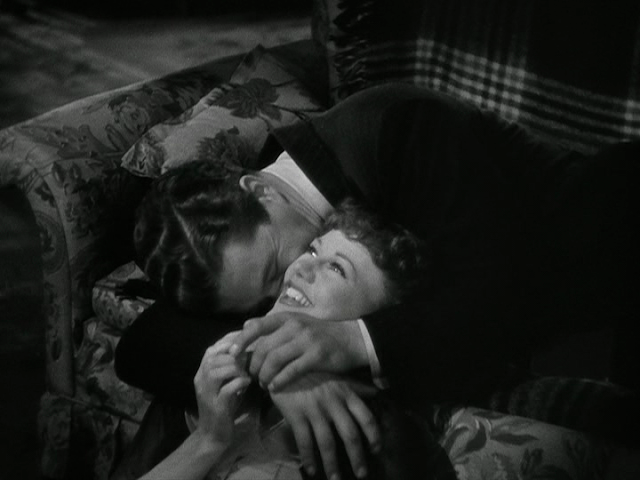















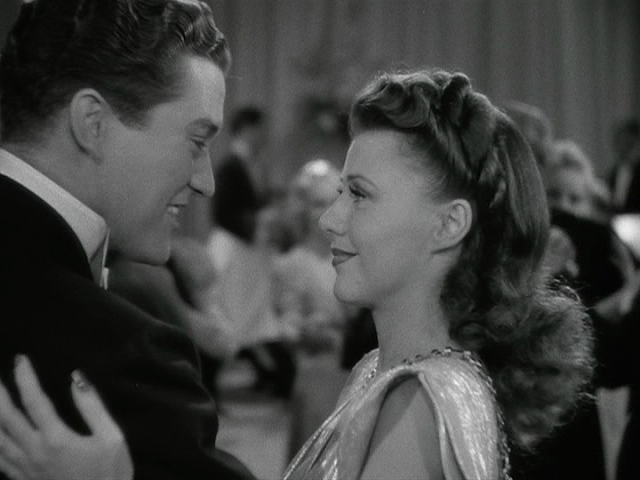










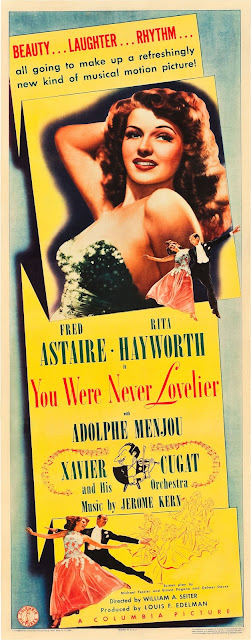


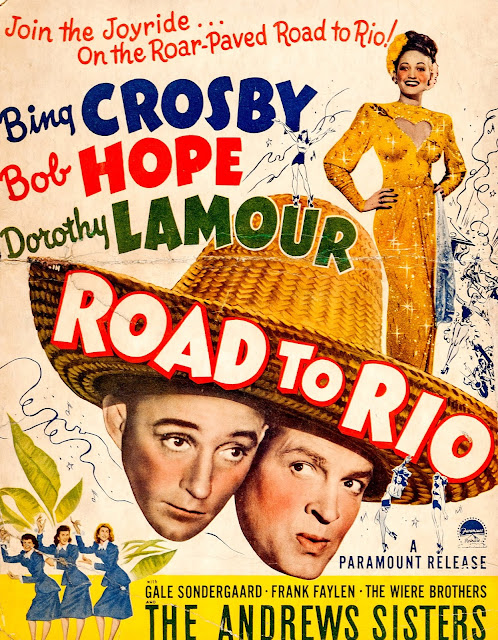



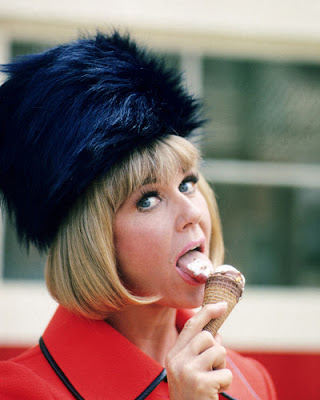
I haven't seen Kitty Foyle in many years. Yet I felt those old "late show" feelings all over again as I read your review of Ginger's exceptional work. It is one of those performances where it has to work or the movie falls apart. Quite remarkable that she was awarded for such a mature and naturalistic performance, knowing the Academy as we do.
ReplyDeleteThanks for all of those grand screenshots. I must explore Kitty Foyle again soon.
Thanks, Paddy! It is pretty amazing that she won considering her competition, but our girl Ginger certainly earned it. It's a bit frustrating that she had to do a drama to win, but we all know how well comedies and musicals do at the Oscars.
DeleteI believe I saw Kitty Foyle when I was very young but don't remember a thing about it. It sounds like a marvelous movie and your excellent article has me excited to check it out soon! Love the note you included from Fred to Ginger on her win :)
ReplyDeleteThank you! It's a terrific movie. I get swept up in it every time. And isn't that note precious? I know he and Ginger weren't best friends, but I do love the respect and camaraderie they shared over the years.
DeleteGinger's performance blew me away. I had only ever seen in her musical comedies until this point, and I didn't realize the extent of her talents. She was terrific in this film.
ReplyDeleteShe really was! I had always loved this film and her performance, but watching her more closely for this post gave me a deeper appreciation for what she could do. Such a tremendous woman.
DeleteI've never been a huge Ginger Rogers fan but this is such a great film and an amazing performance from her. She really shows her range and ability and it's a film I need to revisit. Thanks for a fantastic review!
ReplyDeleteThanks for reading! I'm an enormous fan of Ginger's, so it is nice to hear from someone who isn't as biased as me who still appreciates this film and her performance. :)
DeleteI agree that Ginger's nomination was fair and her role is certainly the kind of role the Academy loves. And Mark is, indeed, either badly developed or really treats her poorly. Great review.
ReplyDeleteThanks for hosting this fun event!
Kisses!
Thanks, Lê! I've never really liked Mark, which I always attributed to my adoration of Dennis Morgan. After this latest viewing, though, I can say with confidence that he is definitely not a great guy. Or at least not one deserving of Ginger!
Delete